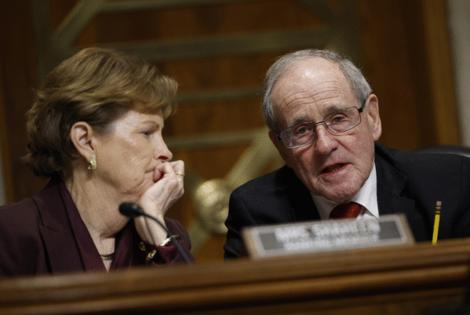Senate panel leaders back Trump's lifting of sanctions on Syria
Published in News & Features
WASHINGTON — The leaders of the Senate Foreign Relations Committee on Thursday offered rare bipartisan support for an executive action this week by President Donald Trump — the lifting of longstanding U.S. sanctions on Syria in a bid to offer the Arab country’s new government a chance after 14 years of civil war.
Trump made the sanctions announcement Tuesday in Riyadh, Saudi Arabia, at the start of the first major foreign trip of his second administration. He followed that up with a meeting with Syria’s new president, Ahmad al-Sharaa, who led the rebel coalition that toppled the regime of longtime dictator Bashar Assad.
Committee Chairman Jim Risch, R-Idaho said he was initially unnerved by the emergence of al-Sharaa as Syria’s new leader given his past as the head of an al-Qaida offshoot before he severed ties and adopted less-extremist stances.
“Obviously the new administration has a checkered past,” Risch said of the new Syrian government. “Having said that, it is a way in the past.”
The chairman said the new government in Damascus has been sending mostly positive signals since coming to power late last year. He and Foreign Relations ranking member Jeanne Shaheen, D-N.H., met with Syria’s new foreign minister in February on the sidelines of the Munich Security Conference.
Risch said Trump had lifted sanctions “a little more robustly” than what he and Shaheen had previously had in mind.
“We’re still in a wait-and-see. Those sanctions have been taken off; they can be put back on and we’re going to continue to watch this. We really hope this works out,” he said. “Syria is a proud country. They have a long history. They have the ability to do this.”
Shaheen said she appreciated some of the initial steps taken by the Syrian government, including working to eliminate the Assad regime’s chemical weapon stockpile and clamping down on the Captagon drug trade, a key source of revenue under the old government.
“The collapse of the Assad regime created a once-in-a-generation opportunity, a chance to deny our adversaries — Iran, Russia, China, not to mention ISIS — a base of operations,” she said. “Too many Syrians have lost their lives fighting oppression to let this window of opportunity pass.”
Many of the multilayered U.S. sanctions were imposed during the Obama administration and strengthened by Congress over the years in response to Assad’s brutal military campaign to suppress a popular uprising by the Syrian people.
“I felt very strongly that this would give them a chance,” Trump said in Saudi Arabia of his decision to lift the sanctions, adding his administration was exploring normalizing diplomatic relations with Syria’s new government.
Questions about Qatar jet
Thursday’s hearing took a more partisan turn as the committee considered several State Department nominees. Democrats on the panel pressed Joel Rayburn, nominated to be assistant secretary of State for Near Eastern Affairs, about Trump’s decision to accept a luxury jet from Qatar.
Democratic senators tried to pin down Rayburn on the ethics and legality of Trump’s plan to accept a Boeing 747 that could be worth more than $400 million from the Qatari government to use as a temporary Air Force One while work is completed on a pair of U.S.-purchased planes.
Trump has complained the current Air Force One is decades old and isn’t in the “same ball game” as the plane the Qataris have offered. The president said the Qatari-gifted plane will “go directly” to his presidential library after he leaves office.
“Is it okay for the president to get a gift to the presidential library? What’s not okay? Would it be okay for a foreign government to give him an envelope of cash?” said Sen. Christopher S. Murphy, D-Conn. “Where do you think the line exists?”
Rayburn didn’t directly answer the question but said he felt confident “the president and the White House are going to follow all applicable laws and guidelines that govern the reception of gifts.”
Meanwhile, House Foreign Affairs Chairman Gregory W. Meeks, D-N.Y., on Wednesday introduced a bill that would prohibit the use of federal funds to facilitate the transfer of an aircraft owned by a foreign government to the U.S. president or to Trump’s presidential library.
Sen. Tim Kaine, D-Va., took his turn at the dais to address the Qatari government directly: “If Qatar wants a long-term relationship with all branches of the U.S. government, (they) are about to commit a grievous error that is likely to be a permanent stain on (their) ethical record,” he said, urging the Qatari government to reconsider.
Rayburn, who spent three years as U.S. special envoy for Syria during Trump’s first administration, also emphasized Trump’s vision for Damascus. He said the president has spelled out a number of things he wants to see including normalization of relations with Israel as part of the Abraham Accords, helping the U.S. prevent a resurgence of the Islamic State and taking over responsibility for guarding the ISIS detention camps in northeast Syria.
“The president is giving the Syrian people, the Syrian interim government, a golden opportunity, a chance to rebuild after half-a-century under oppressive rule,” said Rayburn. “He’s giving them a chance to turn the page on that and chart a new course.”
The committee approved five diplomatic nominations on a mostly party-line basis including nominees to serve as ambassadors to Denmark, Switzerland and Malta.
_____
©2025 CQ-Roll Call, Inc., All Rights Reserved. Visit cqrollcall.com. Distributed by Tribune Content Agency, LLC.







Comments